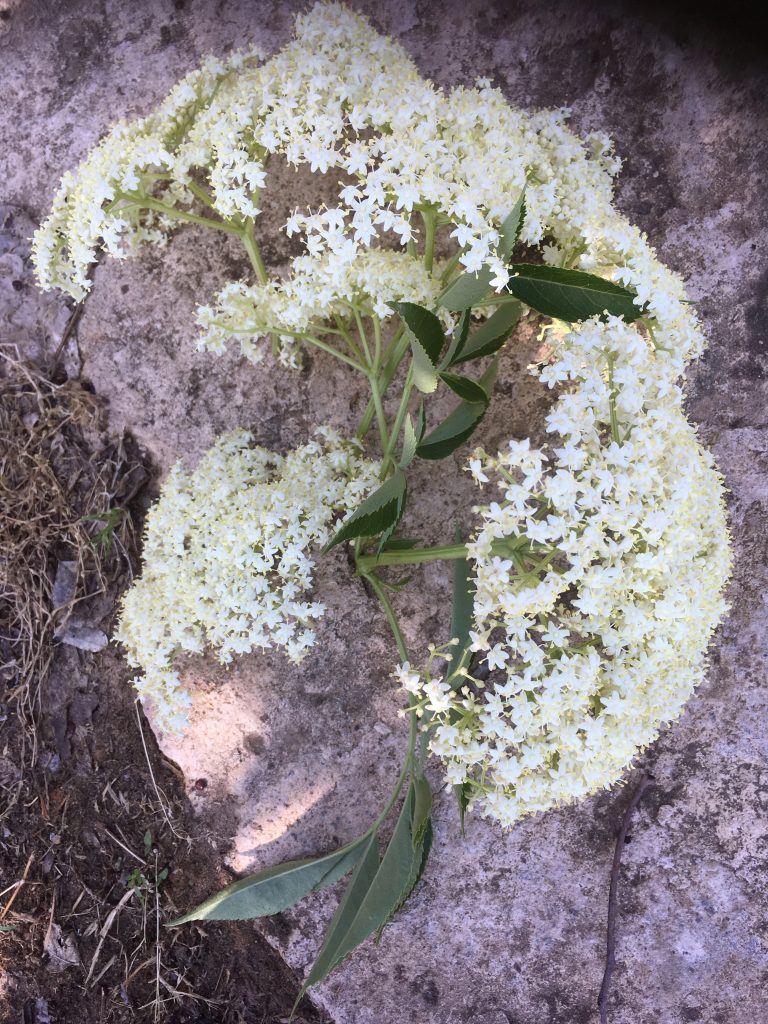Elderflower “Champagne” Recipe - Wild Edible Plants
Elderflower “champagne” is a lightly alcoholic beverage that is naturally bubbly and worthy of raising a glass of in honor of whatever needs celebrating today.
The quotation marks are there because technically I can’t call this sparkling drink champagne since it doesn’t contain grapes from the champagne province of France.

The flowers of the elderberry shrub, Sambucus genus
This elderflower “champagne” recipe is from my book Preserving Everything. It is my version of the way this beverage has been made for at least a couple of centuries. Don’t be alarmed at the large amount of sugar or honey: that’s to feed the wild yeast, not you. There is no need to add yeast because there is enough wild yeast already present on elderflowers.
Foragers take note: only the flowers and fruit of the elderberry shrub are edible.
Elderflower Champagne
Makes approximately 4 quarts
4-6 large elderberry flowerheads (5 or more inches in diameter - use more if yours are smaller)
6 pints cold filtered or non-chlorinated water
2 pints boiling filtered or non-chlorinated water
1 lb honey OR 1 1/2 lbs sugar
1/4 cup cider vinegar OR 2 large lemons (juice & rind) plus 2 tablespoons cider vinegar
1. Do not wash the flowers–it’s their natural yeast that will cause fermentation. Just shake off any insects and remove the thick stalks.
2. Place the honey in a very large bowl and cover with 2 pints of boiling water. Stir to liquefy.
3. Add 6 pints cold water. Stir in the vinegar and the flowers.
4. Cover and leave, for 48 hours, stirring occasionally.
5. Strain out the flowers (and lemon rind, if using). Pour into clean plastic bottles with screw tops (or, better, thick ceramic or beer bottles with flip tops, but the fermentation will be vigorous and could explode regular repurposed wine bottles). Leave at least an inch of head space.
6. Leave at room temperature for a week, “burping” (opening briefly) the bottles occasionally. After that, move them to the refrigerator, but keep “burping” the bottles for another week. Store for an additional 1-4 weeks before serving cold. The earlier you drink it, the yeastier it will taste. Wait the full six weeks from bottling if you want it at its best. (Note: the honey version takes longer to ferment out than the sugar version. The final drink should be fizzy and sweet, but not cloyingly so).
“Fantastic. Informative. Top-notch. Lovely time.” - NYC foraging tour participant
Botany, Ballet, & Dinner from Scratch: A Memoir with Recipes
“Personal, visceral, intimate, natural and authentic. All these words describe Leda’s book. You can literally taste melancholy in one dish and joy in another.” - Mia Wasilevich

The Forager’s Feast: How to Identify, Gather, and Prepare Wild Edibles is part field guide covering 50 plants, mushrooms, and seaweeds with a widespread distribution, and part cookbook for turning these wild edibles into delectable dishes.
“Leda Meredith is, in my opinion, the Foraging Goddess, and the next best thing to this book would be to share a field expedition with her! I highly recommend The Forager’s Feast to anyone who has a love of the wild foods.” - Amazon review by Susan C.
Northeast Foraging: 120 Wild and Flavorful Edibles from Beach Plums to Wineberries

“A book that wild food gatherers of all skill levels will want to own.” - Sam Thayer

Elderberry wine is excellent. I can not find it anywhere.
Note that you should strip the flowers from the green stems. You can do this by rolling the flower heads between your hands. The green stems impart an unpleasant vegetal taste to the final product. Even if you leave out the “thick stalks” as instructed here, but leave in the thinner stems, your flavor will suffer.